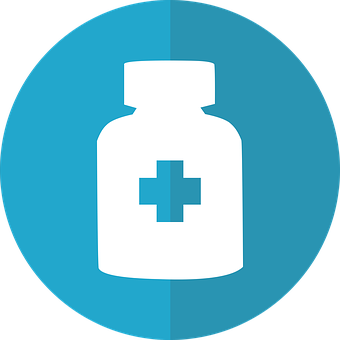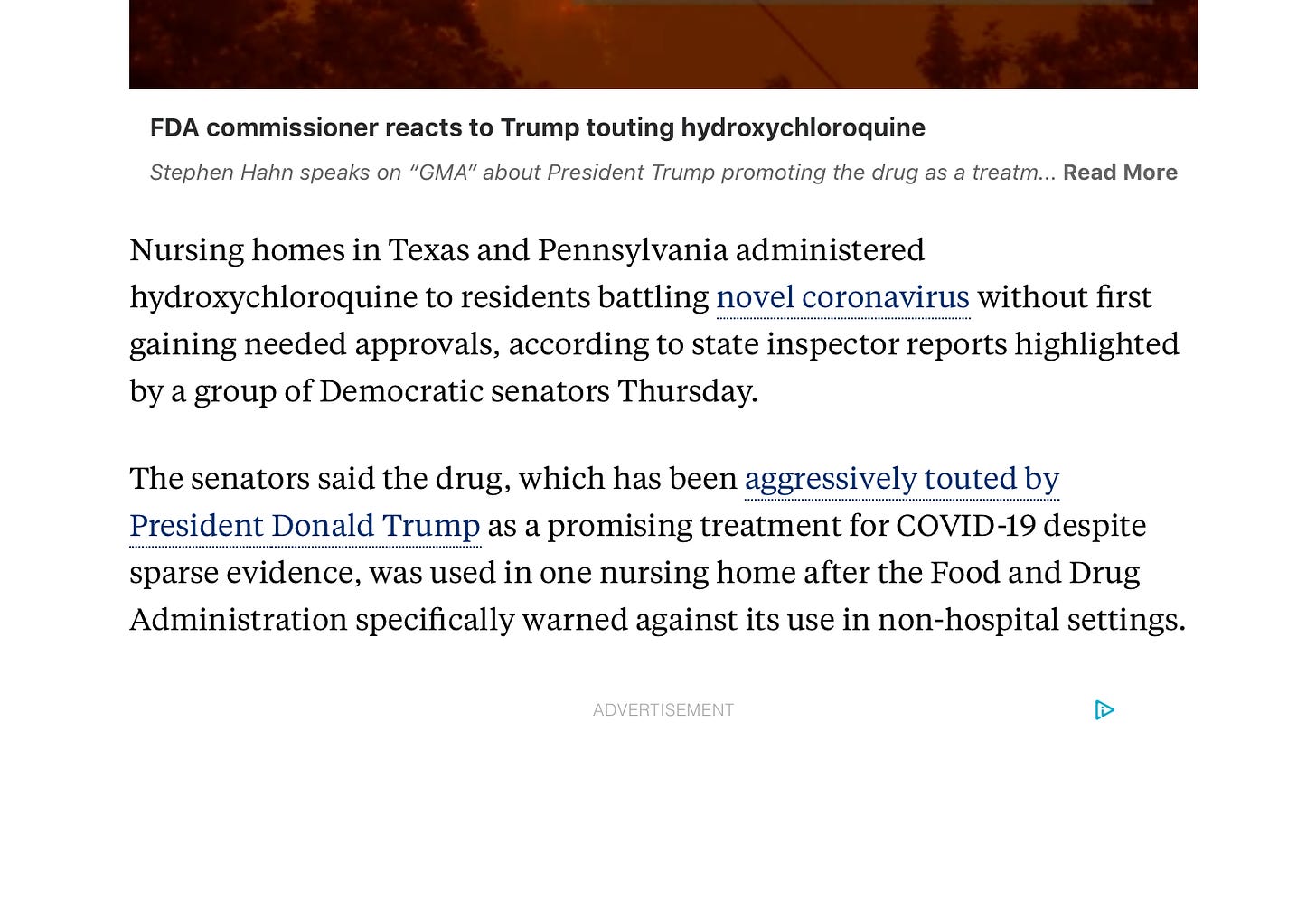
This week’s story is from ABC, about a group of senators questioning the use of hydroxychloroquine at two nursing homes. I’m going to show you very quickly what’s wrong with it from a journalistic standpoint, but I also want to do something a little different. I want to show you what’s wrong with it from a scientific standpoint, too, so I had a good friend of mine take apart the story. She is a toxicologist (someone who studies the harmful health effects of drugs and chemicals) and has over 30 years’ experience designing, performing, analyzing, and writing about biomedical research studies.
As with so much else today, hydroxychloroquine (HCQ) is a touchy subject, I know. Remember, though, the objective of this blog is to remove all emotion from stories like this and to ask lots and lots of questions.
Here’s the full story, originally published 8/27. And here’s my quick analysis, as a journalist, starting with the first two sentences (we’ll get to the video a bit later):

The thesis – that nursing home residents were given a drug without the appropriate approvals - is great and worthy of investigating. But the second sentence starts heading off the rails fast…
1. …by dragging Pres. Trump into the mix. Unless he told these specific nursing homes to use this drug, or to use it without appropriate approvals, this sentence is irrelevant to this story.
2. …by making the unsubstantiated statement: “despite sparse evidence.” Remember, from my first blog post about the Mississippi state flag? Statements like that must always be paired with a second, factual sentence – evidence – to back them up. Otherwise, they are opinions, and opinions don’t belong in hard news.
3. …AND by using the adjective “aggressively” to describe how Pres. Trump “touted” the drug. The use of adjectives and other descriptive words are always a HUGE red flag that the writer is trying to influence your opinion. And – AGAIN - opinions don’t belong in hard news.
I could go on, but the main problem with the rest of the story from a journalism standpoint is MASSIVE. There is something REALLY crucial missing from this story – a giant elephant in the middle of the proverbial room:
What happened to the people in the nursing homes who took the HCQ????
Did they die? Did they live? Did they get a little sick? A lot sick? What kind of journalist wouldn’t think to ask these kinds of questions? At the very least, this information would provide some evidence about whether HCQ can be safely administered under a doctor’s care in a nursing home setting.
If nothing bad happened (the more likely scenario here, since we all know the media would have been all over any adverse effects of the drug), then why was there no mention of the residents’ health outcomes? Is it possible that HCQ had no untoward effects – or perhaps even helped the residents – older people most at risk for poor COVID outcomes?
Funny I should ask all of that, right? Because, although our “journalist” friends over at ABC weren’t remotely curious about those questions, my friend, the toxicologist was.
According to her scientific analysis, this story is based on a false premise, which is that HCQ has been indisputably proven dangerous and ineffective in every capacity as a treatment for COVID-19. In fact, she says, the safety and effectiveness of the drug depend on the condition of the patients being treated. Here’s a little background she wants you to know before we get back to the story:
Media coverage of HCQ conflates two sets of patients:
People who have been exposed and in whom we want to prevent the illness from becoming serious – “outpatients” in the early phase of the disease.
People who are already seriously ill and have been hospitalized – “inpatients” in the late phase of the disease.
Why the difference? Because COVID-19 is a multiphase-disease. The treatment of choice very much depends on what phase of the illness – early or late – you are dealing with. Here’s how COVID unfolds:
1) Early phase – the virus infects cells and then begins to replicate (make copies of itself). The number of viruses explodes, becoming an army that invades the bloodstream to infect the rest of the body. This is how the disease progresses in someone coming down with COVID (outpatients).
To help such patients, you want to short-circuit the illness by preventing the virus from reproducing. Antivirals that block infection or viral replication (like HCQ, Ivermectin, and yes, Remdesivir) may be effective at halting this early phase process.
2) Mid-phase to late phase – The immune system goes to battle with the invading army of viruses. If the immune system overreacts but doesn’t overcome the invasion, more damage ensues from “friendly fire” (cytokine storm) and the resulting inflammation. Furthermore, this particular coronavirus, SARS Cov-2, causes excess blood lots to form, blocks blood flow, and deprives organs (like the lungs) of oxygen. When the disease has progressed to late stage, patients are very sick and may need to be hospitalized and treated aggressively.
In hospitalized patients, a gamut of interventions are used to tamp down the cytokine storm and treat inflammation, excess blood clotting, oxygen deprivation, and organ damage. Because the horse is long “out of the barn” (so to speak), at this stage antivirals are far less effective.
Because HCQ interferes with viral infection and replication, it is likely most effective when used early to help prevent the disease from progressing. Put in technical terms, HCQ should be considered and evaluated for “outpatient” use.
Though the ABC story correctly notes that the FDA revoked an emergency authorization to use HCQ, it omits a crucial piece of information: FDA’s decision was based solely on studies in late phase, hospitalized patients.
This is why Dr. Harvey Risch, a Yale epidemiologist who has analyzed the studies in patients who are not hospitalized, argues in this Newsweek opinion piece that it should be used in vulnerable outpatients at high risk for progressing to poor outcomes, and has criticized the FDA for relying on hospital studies alone in its decision making.
((He’s hardly alone, by the way. Check out this really interesting site, which extensively documents nearly 100 other studies globally on early outpatient treatment, many of which provide evidence for effectiveness.))
Going back once more to the ABC News story, the video interview with FDA commissioner, Stephen Hahn, at the top, actually debunks some of the written narrative in the story beneath it. When challenged by George Stephanopoulos on HCQ safety, the commissioner responds that the drug is FDA approved and safe for people with lupus or travelers who want to ward off malaria. He also admits that treatment decisions on FDA approved drugs should be between the patient and their doctor.
And here’s a relevant paragraph from the FDA document that revoked emergency use of HCQ in the nation’s stockpile. Note the section we have bolded at the end:
Chloroquine and hydroxychloroquine are both FDA-approved to treat or prevent malaria. Hydroxychloroquine is also approved to treat autoimmune conditions such as chronic discoid lupus erythematosus, systemic lupus erythematosus in adults, and rheumatoid arthritis. Both drugs have been prescribed for years to help patients with these debilitating, or even deadly, diseases, and FDA has determined that these drugs are safe and effective when used for these diseases in accordance with their FDA-approved labeling. Of note, FDA approved products may be prescribed by physicians for off-label uses if they determine it is appropriate for treating their patients, including during COVID.
“In other words,” my toxicologist friend concluded, “Doctors are not going rogue! According to FDA, they are within their rights to offer HCQ off-label to outpatients in nursing homes if they deem it appropriate, despite the NIH treatment guidelines to the contrary.”
My friend agrees that if nursing home doctors were treating patients with any medicine - HCQ or otherwise - without the appropriate authorization or consent, that is definitely worthy of exploration, and is an entirely valid issue. But the whole underlying assumption in this story that HCQ is proven ineffective is wrong for outpatients.
So why on earth are journalists saying the opposite is definitively true?



